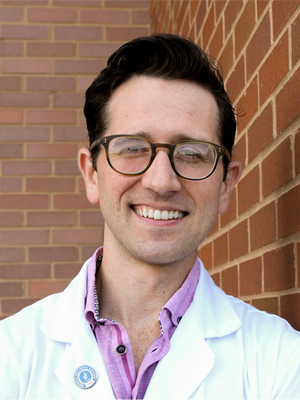
Matthew Smith, M.S., Ph.D.

Contact
Phone: 330.325.6437
Email: msmith13@neomed.edu
Office
Location: RGE-438
Hours: By appointment
Publications
View publications
Academic Title(s)
- Assistant Professor, Pharmaceutical Sciences
Administrative Title(s)
- Associate Director, Integrated Pharmaceutical Medicine (IPM) Graduate Program
Bio
I received a B.A. in Neuroscience from the College of Wooster. I am a proud NEOMED alumnus having received both my M.S. and Ph.D. degree though the Integrated Pharmaceutical Medicine Program. In my time at NEOMED I’ve had the pleasure of teaching neuroscience and human anatomy/physiology topics to a diverse set of talented students in the medical, pharmacy and graduate colleges. In my current role, I am focused in developing and implementing new curricular content in the College of Graduate Studies. My research on the neurobiological mechanisms governing vision-related symptoms in pediatric/adolescent brain trauma is generously supported in part by Akron Children’s Hospital.
Area of Expertise/Research Interests
My research focus is to understand the neurobiological mechanisms that disrupt eye-brain communication in injury and disease. Using blend of classic neuroanatomical and neurophysiological techniques and new/innovative high-resolution correlative microscopy approaches (epifluorescent, electron, and multiphoton), my lab can identify and assess structural and functional changes occurring to injured/diseased neurons .
Long-term we are interested in improving diagnostic capabilities through developing approaches that take advantage of the relative accessibility of the eye to isolate and track neuron dysfunction occurring in the brain. Currently we are exploring the role of a subset of retinal neurons, ipRGCs, in adolescent traumatic brain injury (TBI). We posit that pre-degenerative alternations to these specific, unique, and vulnerable neurons are likely responsible in part for the visual and vision-influenced symptoms commonly experienced by patients after brain trauma.
Educational Background
- Ph.D. in Integrated Pharmaceutical Medicine, NEOMED, 2017
- M.S. in Integrated Pharmaceutical Medicine, NEOMED, 2014
- B.A. in Neuroscience, The College of Wooster, 2012
Distinctions
- Graduate Faculty Advising Status College of Graduate Studies
Presentations
- Assessing the morphology of intrinsically photosensitive retinal ganglion cells after mild traumatic brain injury. Akron Children’s Hospital. October 15th, 2019
- Axonopathy and Synaptopathy in Glaucomatous Neurodegeneration. Presented at the College of Wooster, Wooster, Ohio. November 30th, 2017
- From Boutons to Bulbs: Exploring Fluorescent and 3D Electron Microscopy to Examine Axonopathy and Synaptopathy in Mouse Models of Glaucoma. Presented at Microscopy of Northeast Ohio spring meeting at John Carroll University, Cleveland, Ohio. May 18th, 201
Publications
- Smith MA, Plyler ES, Dengler-Crish CM, Meier J., and Crish SD (2018). Nodes of Ranvier in glaucoma. Neuroscience 390: 104-118. PMID: 30149050
- Harun-Or-Rashid M., Pappenhagen N, Palmer PG, Smith MA, Gevorgyan V, Wilson GN, Crish SD, Inman DM (2018). Structural and Functional Rescue of Chronic Metabolically Stressed Optic Nerves through Respiration. Journal of Neuroscience 8(22): 5122-5139. PMID: 29760184
- Dengler-Crish CM, Smith MA, Wilson GN. (2017). Early evidence of low bone density and decreased serotonergic synthesis in the dorsal raphe of a tauopathy model of Alzheimer’s disease. Journal of Alzheimer’s disease. 55(4): 1605–1619. PMID: PMC5181667.
- Smith MA, Xia CZ, Dengler-Crish CM, Fening KM, Inman DM, Schofield BR, Crish SD (2016). Persistence of intact retinal ganglion cells terminals after axonal transport loss in the DBA/2J mouse model of glaucoma. Journal of Comparative Neurology. 524(17):3503-3517. PMID: 27072596.
- Dengler-Crish CM, Smith MA*, Inman, DM, Young JW, Wilson GN, Crish SD (2014). Anterograde transport blockade precedes deficits in retrograde transport in the visual projection of the DBA/2J mouse model of glaucoma. Frontiers in Neuroscience. 8:290 PMID: 25278826

